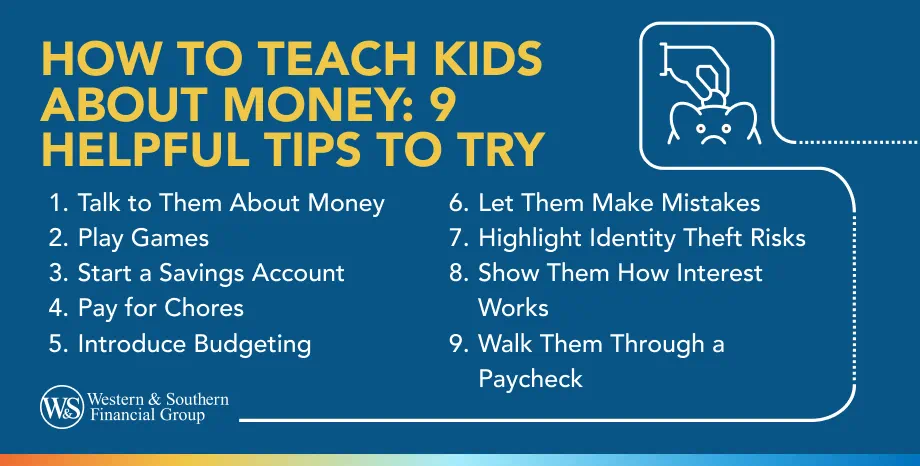

Table of Contents
Key Takeaways
- Have open conversations with kids about money - where it comes from, saving, spending, etc. This builds a strong financial foundation.
- Use games and activities to teach financial concepts in an engaging way. Apps and online games can be helpful.
- Open a savings account and show kids how compound interest works over time.
- Pay kids for chores to teach the value of working for money. Allow them to budget their earnings.
- Explain paychecks and how taxes/deductions work. Walk them through the process so their first paycheck makes sense.
Financial education is a life-long learning process. However, some teens and young adults may not be too familiar with important elements of personal finance, saving for retirement or estate planning. This can sometimes put people at a disadvantage — as time is often an important factor for growing long-term savings.
That's why some parents begin focusing on financial literacy for kids while their children are still in elementary school. Talking about money and learning together can be a fun exercise for the whole family.
Here are nine ideas on how to teach kids about money.
1. Talk to Them About Money
Sitting your kids down and having a conversation about money, where it comes from, how it gets saved and why it's spent can be the start of a sound financial foundation.
You might even want to set up multiple piggy banks for young kids, one each for saving, spending and giving, for example. As your kids get into their teen years, you can have more serious conversations around money — beyond spending and saving — and its real-world impact.
2. Play Games
Even if your kids are young, they can still understand the concept of money. Look around your house and see the games and toys they have. Do they have a toy cash register for a pretend shop? That's a great way to start teaching them about how money works. In addition, there are plenty of online games and apps that focus on how to teach kids about money. Spend time with kids while they are young and find more complex games as they get older.
3. Start a Savings Account
Regardless of how young or old your child is, a great way to focus on financial literacy for kids is to have them start saving.
Many financial institutions and online banks offer savings accounts for minors. You can help your child open a savings account with a small deposit to get things started, then you can log into the account together every so often to show how compound interest is at work in their savings.
4. Pay for Chores
A lot of parents create an allowance system for their kids. For example, if a child does specific chores each week — such as cleaning their room or doing the dishes — they'll earn a little bit of money.
It's a great way to have your kids learn about working for money, and you can offer them more chores to make extra money if they have something they want to buy.
5. Introduce Budgeting
Beyond chores, your kids might get money from a few other sources, such as a check slipped into a birthday card, holiday presents or cash to "spend on something nice" from a grandparent.
You can use this income to start teaching your kids about budgeting. They might have something they want to buy, such as a new video game or book. Show them how they can take the money they have and separate it into buckets so it can go toward fun purchases and savings at the same time.
6. Let Them Make Mistakes
This might be a hard one. As a parent, you want to help your kids and protect them from mistakes — but it's OK to have them experience a minor pitfall or two. Through these experiences, they can start learning about the ups and downs of money at a young age.
For instance, if they want to buy something with their money that you think they don't need, consider letting them buy it and see for themselves. Sometimes, learning financial lessons while the stakes are still relatively low can make a lasting impression.
7. Highlight Identity Theft Risks
As your kids get older, they'll likely spend more time online or on mobile devices. When doing so, it's very easy for them to log into an account or app and forget about it, leaving all sorts of data exposed. Chat with kids about protecting themselves online from identity theft, which can have financial consequences.
8. Show Them How Interest Works
Many adults get a shock to their system when they see the interest rates on credit cards or personal loans. You can help your kids avoid this by explaining to them how interest works.
If your children don't have the cash to buy something they want, offer them a loan with interest. For older kids, you might consider getting them a credit card with a small limit. It can show them how interest rates impact debt and spending, and may help teach them the importance of building good credit at a young age.
9. Walk Them Through a Paycheck
You might remember back to your first paycheck. There may have been a moment when you got it and noticed it did not align with what you thought you were getting paid.
The best way to combat this confusion for your children is to explain what happens with a paycheck through deductions for taxes, benefits and more. Teaching them about various withholdings is a valuable lesson in financial literacy for kids.
It's Never Too Late (or Early) to Start
Many parents worry about how to teach kids about money, but the best thing to do is start by having a conversation. The journey to financial literacy is something you can all learn together.
















